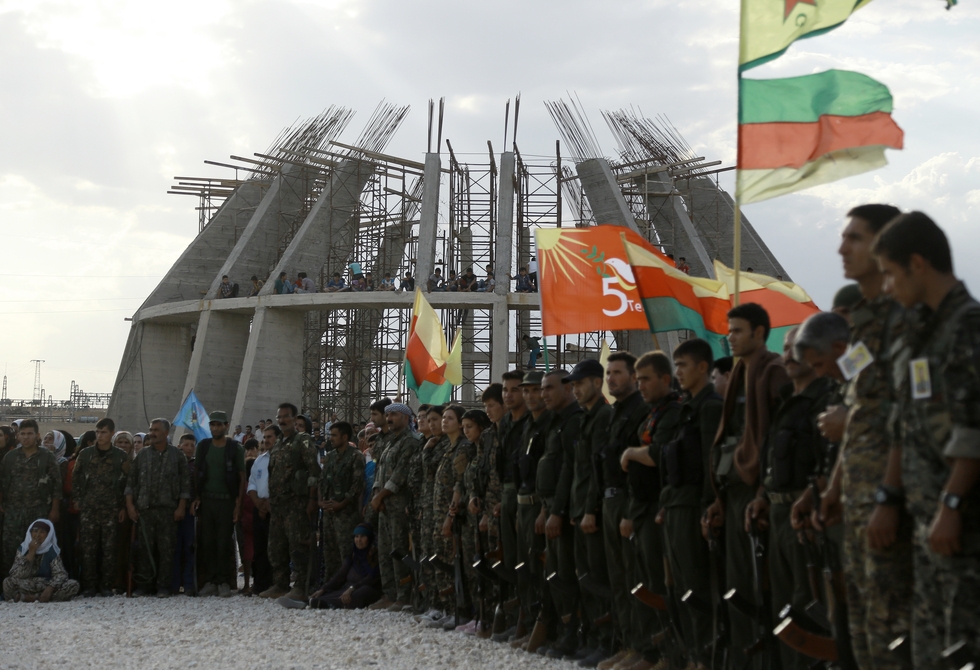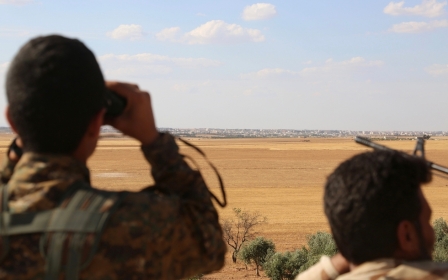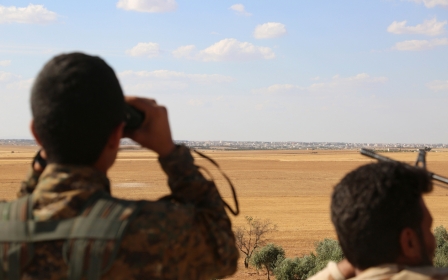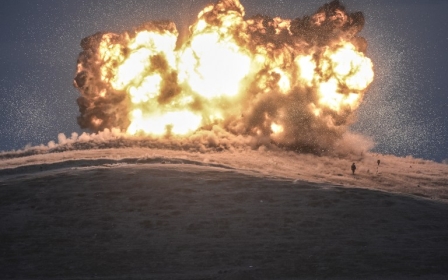Kurdish and Arab forces push into centre of Syria's Manbij

Kurdish and Arab forces have pushed further into the heart of the Islamic State-controlled city of Manbij, as an influential US think tank declared Kurdish autonomy in the region inevitable.
A US defence spokesperson confirmed that the Syrian Democratic Forces (SDF), a group composed of the pro-Kurdish People’s Protection Units (YPG) and allied Arab groups, began to push into the centre of the northern Syrian city of Manbij, after surrounding its perimeter.
“Despite continued ISIL resistance, those forces have begun their push into the city which is surrounded on all sides now and they have begun clearing ISIL defences in the city’s outskirts,” said Pentagon spokesman Peter Cook on Monday, using an alternative acronym for IS.
The SDF offensive against Manbij was launched on 31 May, driving across the Euphrates River from the east backed by 200 US special forces troops providing military advice.
IS have reportedly taken as many as 1,000 Kurdish civilians hostage in areas under their control west of Manbij, according to the Syrian Observatory for Human Rights.
According to ARA News, SDF forces have captured the Sharia roundabout in Manbij and also expelled IS militants from the Manbij grain silos and the Akhdar farms south of the city.
Manbij lies in the eastern plains of Aleppo province, which has become a hotbed for clashes between a variety of rebel and government groups.
The push of the SDF and YPG forces in northern Syria has led many observers to predict the full establishment of an autonomous region by the mainly Kurdish forces.
A report by the Rand corporation, an influential foreign policy think-tank in the US, has warned that “de facto autonomy” currently existed for Kurds in the north of the country.
“Absent the regime’s ability to field a greatly enhanced military capability or Turkish intervention to stop it, it is not clear how the Kurdish progress toward autonomy can be reversed,” said the report.
Syrian President Bashar al-Assad has repeatedly declared his opposition to federalism in Syria.
Addressing the Syrian parliament in early June, the president declared his intention retake “every inch” of Syria from his opponents.
However, the YPG and its allies have increasingly asserted their power over a region of northern Syria they refer to as “Rojava”, a Kurdish word referring to West Kurdistan.
On 17 March, the groups declared the establishment of a “federal democratic system” which they advocated as a method of decentralised, council-based democracy that could be expanded to other regions in the Middle East.
However, others have claimed that proclamations of democracy mask a move to consolidate the power of the Democratic Union Party (PYD), the YPG's political wing, which is linked to the Kurdistan Workers Party (PKK).
The YPG have also been frequently accused of carrying out abuses against the Arab population, often accusing them of harbouring IS operatives.
Aid reaches Kurdish Aleppo enclave
Elsewhere in Syria, Kurdish activists were reporting that aid had entered into the besieged Sheikh Maqsoud district of Aleppo.
The Kurdish enclave in Aleppo has been under siege by Syrian rebel groups, including the Al-Qaeda-affiliated Al-Nusra Front and hardline Salafist group Ahrar al-Sham, for years.
“The convoy, which consisted of 13 trucks, delivered basic supplies to the residents of Sheikh Maqsoud. The aid included food, medicine and other basic supplies,” said rights activist Dawood Osman, speaking to ARA News.
The news site quoted local sources as saying that as many as 40,000 civilians are still living in the district with scarce resources.
Osman said that the rebels groups had been preventing basic supplies from entering Sheikh Maqsoud and called on the UN to do more to alleviate the situation.
“We will definitely need more help in the coming days, as there are thousands of people here in urgent need for many supplies in order to survive this crisis,” he said.
“We hope the United Nations could play a greater role in stopping the shelling on this civilian neighbourhood and opening humanitarian corridors to deliver more aid.”
Tensions have been high between Syrian rebel groups and the YPG, with the former accusing the latter of being in tacit alliance with Assad and his Russian allies.
The YPG has countered by claiming that many rebel groups are militant Islamists who are hostile to Kurdish demands for autonomy.
More than 280,000 people have been killed since Syria's conflict erupted in March 2011, after a widespread protest movement evolved into a complex, multi-front war that has drawn in global powers.
Middle East Eye propose une couverture et une analyse indépendantes et incomparables du Moyen-Orient, de l’Afrique du Nord et d’autres régions du monde. Pour en savoir plus sur la reprise de ce contenu et les frais qui s’appliquent, veuillez remplir ce formulaire [en anglais]. Pour en savoir plus sur MEE, cliquez ici [en anglais].




